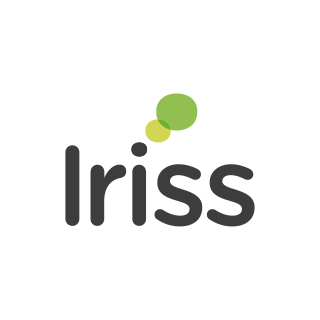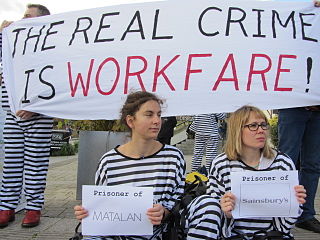Related Research Articles
Staffing is the process of finding the right worker with appropriate qualifications or experience and recruiting them to fill a job position or role. Through this process, organizations acquire, deploy, and retain a workforce of sufficient quantity and quality to create positive impacts on the organization’s effectiveness. In management, staffing is an operation of recruiting the employees by evaluating their skills and knowledge before offering them specific job roles accordingly.
Jobseeker's Allowance (JSA) is an unemployment benefit paid by the Government of the United Kingdom to people who are unemployed and actively seeking work. It is part of the social security benefits system and is intended to cover living expenses while the claimant is out of work.

Recruitment refers to the overall process of identifying, sourcing, screening, shortlisting, and interviewing candidates for jobs within an organization. Recruitment can also refer to the processes involved in choosing individuals for unpaid roles. Managers, human resource generalists and recruitment specialists may be tasked with carrying out recruitment, but in some cases public-sector employment, commercial recruitment agencies, or specialist search consultancies are used to undertake parts of the process. Internet-based technologies which support all aspects of recruitment have become widespread, including the use of artificial intelligence (AI).

The Prince's Trust is a charity in the United Kingdom founded in 1976 by Charles, Prince of Wales, to help vulnerable young people get their lives on track. It supports 11 to 30-year-olds who are unemployed and those struggling at school and at risk of exclusion. Many of the young people helped by The Trust are in or leaving care, facing issues such as homelessness or mental health problems, or have been in trouble with the law.
Shaw Trust is a charitable organisation in the United Kingdom which supports people with complex needs into good work. It was founded in the village of Shaw in Wiltshire in 1982.
Canterbury College is a part of the EKC Group of colleges and provides Further and Higher Education in Canterbury, Kent, England. It was established in 1947.

NHS Scotland, sometimes styled NHSScotland, is the publicly funded healthcare system in Scotland, and one of the four systems which make up the National Health Service in the United Kingdom. It operates fourteen territorial NHS boards across Scotland, seven special non-geographic health boards and NHS Health Scotland.

Emergency medical services in the United Kingdom provide emergency care to people with acute illness or injury and are predominantly provided free at the point of use by the four National Health Services (NHS) of England, Scotland, Wales, and Northern Ireland. Emergency care including ambulance and emergency department treatment is only free to UK residents and a charge may be made to those not entitled to free NHS care. The NHS commissions most emergency medical services through the 14 NHS organisations with ambulance responsibility across the UK.
The NHS Business Services Authority (NHSBSA) is an executive non-departmental public body of the Department of Health and Social Care which provides a number of support services to the National Health Service in England and Wales. It was created on 1 October 2005 following a review by the Department of Health of its "arm's length bodies". It began operating on 1 April 2006, bringing together five previously separate NHS business support organisations.

The National Health Service (NHS) is the publicly funded healthcare system in England, and one of the four National Health Service systems in the United Kingdom. It is the second largest single-payer healthcare system in the world after the Brazilian Sistema Único de Saúde. Primarily funded by the government from general taxation, and overseen by the Department of Health and Social Care, the NHS provides healthcare to all legal English residents and residents from other regions of the UK, with most services free at the point of use for most people. The NHS also conducts research through the National Institute for Health Research (NIHR).
Modernising Scientific Careers (MSC) is a UK-wide government initiative to address the training and education needs of the whole healthcare science workforce in the National Health Service (NHS). The initiative won a Healthcare Innovation Award in 2013. Its stated aims are to introduce flexibility, sustainability and modern career pathways for the healthcare science workforce to meet future needs of the NHS.

Iriss is a Scottish charitable company, based in Glasgow, Scotland which acts to make improvements to how the social services workforce in Scotland makes use of knowledge and research.
Shared Lives, which is also known as Adult Placement in some areas, is a UK form of support and accommodation for adults with need wherein approved individuals or families open their lives to aid older or disabled persons.

Workfare in the United Kingdom is a system of welfare regulations put into effect by UK governments at various times. Individuals subject to workfare must undertake work in return for their welfare benefit payments or risk losing them. Workfare policies are politically controversial. Supporters claim that such policies help people move off welfare and into employment whereas critics argue that they are analogous to slavery or indentured servitude and counterproductive in decreasing unemployment.
The Work Programme (WP) was a UK government welfare-to-work programme introduced in Great Britain in June 2011. It was the flagship welfare-to-work scheme of the 2010–2015 UK coalition government. Under the Work Programme the task of getting the long-term unemployed into work was outsourced to a range of public sector, private sector and third sector organisations. The scheme replaced a range of schemes which existed under previous New Labour governments including Employment Zones, New Deal, Flexible New Deal and the now abolished Future Jobs Fund scheme which aimed to tackle youth unemployment. Despite being the flagship welfare-to-work scheme of the Conservative-led coalition government, and then the incumbent Conservative government from May 2015, the DWP announced, in November 2015, that it was replacing the Work Programme and Work Choice with a new Work and Health Programme for the longer-term unemployed and those with health conditions. The DWP also announced that it would not be renewing Mandatory Work Activity and Help to Work which included Community Work Placements.
The Progressive Wage Model (PWM), or sometimes known just as the progressive wage, is a wage structure in Singapore advocated by its labour movement, which is led by the National Trades Union Congress (NTUC), the sole national trade union in Singapore. The objective of introducing the Progressive Wage Model is to increase the salaries of workers through the enhancement of skills and improving productivity.
NCFE, previously the Northern Council for Further Education, is an Awarding Organisation nationally recognised by the qualification regulators for each country of the United Kingdom. NCFE is regulated by the Office of the Qualifications and Examinations Regulator in England, the Welsh Government in Wales and the Council for Curriculum, Examinations and Assessment in Northern Ireland.
Seetec is a training provider in the United Kingdom and Ireland.
PeoplePlus is a recruitment and training provider based in Birmingham, United Kingdom The company runs a range of frontline public services including employability support, adult skills training, apprenticeships, independent living, and prison education as well as offering recruitment and training for employers.

The North Wales Economic Ambition Board, branded as Ambition North Wales, is a joint committee and decision-making body overseeing the North Wales Growth Deal, a regional economic growth deal covering the North Wales region. It is a partnership between the six local authorities of Conwy County Borough, Denbighshire, Flintshire, Gwynedd, Isle of Anglesey, and Wrexham County Borough, and other local partners in the region, including Bangor University, Wrexham Glyndŵr University, Grŵp Llandrillo Menai, Coleg Cambria, and various private sector representatives.
References
- 1 2 "An introduction to the sector-based work academy programme". gov.uk. Department for Work and Pensions. 18 August 2020. Retrieved 16 November 2020.
- ↑ "Sector-based work academies". nuh.nhs.uk. Nottingham University Hospitals NHS Trust . Retrieved 16 November 2020.